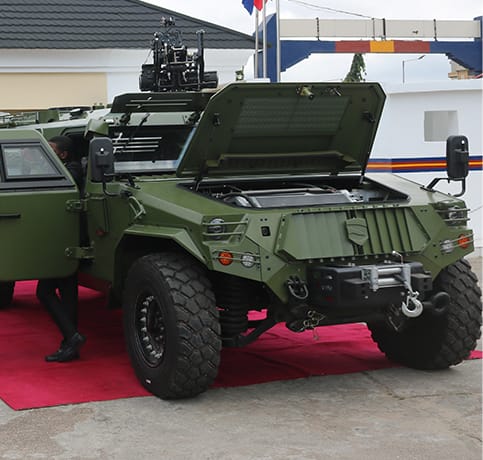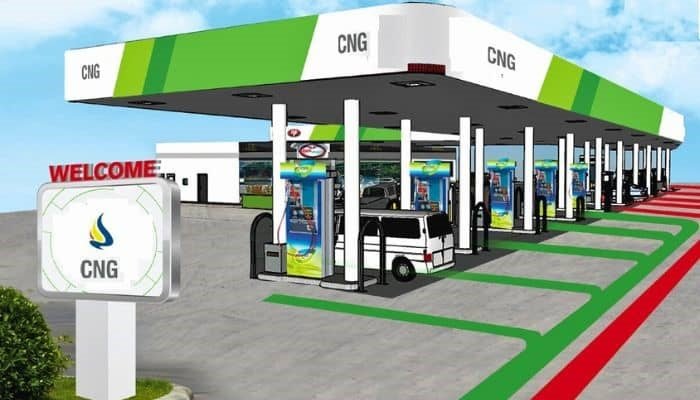By Sumaila Ogbaje, News Agency of Nigeria (NAN)
Local players are indeed making an impact in Nigeria’s defence production.
The Defence Industries Corporation of Nigeria (DICON) is a key player in this sector, and it has been working to increase its local manufacturing and production capabilities.
In fact, the Nigerian government has set a target for DICON to become 40 per cent self-sufficient in local manufacturing and production of defence equipment by 2027.
DICON, established in 1964, is tasked with producing essential military hardware, including small arms, ammunition, and armoured vehicles.
This is a significant step towards reducing the country’s reliance on foreign defense imports.
Some local companies, such as E-PAIL Nigeria and Proforce Nigeria Limited are already making impressive contributions to Nigeria’s defence production.
For example, E-PAIL has produced Mine-Resistant Ambush Protected (M-RAP) vehicles and Armored Personnel Carriers (APCs) and made significant milestone in bolstering Nigeria’s fight against insecurity by delivering 20 cutting-edge Light Tactical Armoured Vehicles (LTAVs) to the Defence Headquarters in the cause of the year.

The company officially handed over the LTAVs, equipped with advanced weapons and communication systems, to revolutionise military operations, enabling early detection of adversaries and effective engagement while ensuring seamless coordination.
According to E-PAIL Chairman, Kola Balogun, the presentation demonstrated the growing involvement of indigenous industries in strengthening Nigeria’s defence technology.
Speaking with NAN on the development, Balogun said the nation has a very good footprint with the new DICON law, aimed at creating an enabling environment for the local player to make significant impact in developing capabilities.
He, however, said that the implementation of the law was key to achieving the desired end by making sure that DICON remains an unbiased umpire over issuing of license, standard and compliance.
“In the process, we will now be able to domesticate global standards to domestic standards to address our peculiarity.
“However, as a company, we are already making a serious impact on the defence industry with some of our newly developed equipment like anti-mine vehicle, light armoured vehicles with so much sophistication.
“(This will) address our peculiarity because there are some things that you might put as a capability feature to address some of the inadequacies we have in the previous equipment.
“These efforts can only be complemented if we have sufficient support, sufficient research and sufficient patronage from all the services.
“These are things that will keep boosting our morale as private investors in the defense industry to invest more because there are people who are going to make use of it,” he said.
Balogun, who is the Secretary General, of the Defence Industries Association of Nigeria (DIAN), said the efforts of the local players had aided remarkable victory recorded by the military in the frontline.
He said that domesticating technology was the best way to address the peculiarity of the nation’s security dynamics, adding that building local capability into the enhancement was a way to deal with such local peculiarities.
Balogun called on the Federal Government to draw a pure guideline on incentive that would enhance local capabilities in form of intervention needed for the local players to compete favourably.
He said that Nigeria could also export defence equipment to its neighbouring countries through local players if fully supported.
“We have started well by creating enabling laws, but that is not the first time. We want the government to further strengthen their deployment strategy in such a way that it will give sufficient benefit to the local investment.
“There is also the need for sufficient control so that we can become a formidable defence industry that will be second to none in the world.
“We want to encourage the government to reduce the bureaucratic bottleneck surrounding the revamping of our steel industry because the defence industry generally relies on steel.
“It is steel related right from the ammunition, arms, missiles, vehicles, everything.”
On his part, the Business Development Manager of Proforce, Mr Kayode Nariwo, said that Proforce had produced different military platforms in support of the current onslaught against terrorism and banditry in Nigeria.
Nariwo said that the Nigerian Army had taken delivery of several PF ARA Mines Resistant Ambush Protected (MRAPS) vehicles as well as a few PF VIPERS.
He added that the Defence Headquarters also took delivery of 15 PF Vipers while the Nigerian Air Force commissioned Proforce’s Armoured Buffalos (IACVs) Improvised Armoured Combat Vehicles.
“The PF ARA is a 15 tonnes MRAP which was deployed to the North East at the peak of the war against Boko Haram since 2018 while the PF Vipers is a 9 tonnes MRAP and has been deployed recently in the Northwest part of Nigeria,’’ he said.
On the new DICON Act, Nariwo said the new act was meant to provide local producers with better chances and opportunities, saying their expectations were high with services chiefs’ desire to use home-made solutions.
“This is a lesson from the war between Ukraine and Russia which places more emphasis on local solutions.
“The combination of the new DICON Act and Executive Order 5 will give leverage to Local manufacturers.
“The most important thing is to make sure the platforms meet international standards. Another advantage for the Armed Forces is availability of spare parts and after sales services that local manufacturers provide.
“One major challenge is convincing the military that we have developed capacity to take on their requests. Another challenge is competing with foreign made platforms as well as the issues with typical infrastructure, cost of power and access to forex.”
He added that there were enormous prospects for local players with the current military leadership being Pro-Local producers as well as the willingness of International Organisations to partner with local firms for Technology Transfer (ToT).

The Minister of State for Defence, Dr Bello Matawalle, recently presided over the inaugural board meeting of the DICON, marking a significant step toward revitalising the nation’s defence manufacturing sector.
The meeting, held at the Ministry of Defence in Abuja, followed the enactment of the DICON Act 2023 signed into law by President Bola Tinubu in September 2023.
The legislation aims to modernise and expand DICON’s operations, furthering Nigeria’s ambition to achieve self-sufficiency in defence production.
The board meeting brought together top military officials, service chiefs, and representatives, including those from the Nigeria Police Force, to discuss strategies for enhancing DICON’s role in national security.
In his remarks, Matawalle underscored DICON’s central role in Nigeria’s defence infrastructure, saying that all DICON factories must produce towards achieving the vision of self-sufficiency in defence manufacturing.
He emphasised the importance of partnerships with local industries to foster job creation, employment, and enhance Nigeria’s defence capabilities.
He reaffirmed President Tinubu’s administration’s commitment to supporting DICON as a critical component of Nigeria’s military industrial complex.
DICON’s expanded mandate under the new law aligns with Nigeria’s goals of reducing dependency on foreign arms imports, enhancing national security, and fostering industrial growth.
Recent advancements, such as the production of armoured vehicles and personnel carriers, reflect the corporation’s increasing role in Africa’s defence manufacturing landscape as well underscores the significant role the private sector will play in this milestone. (NANFeatures)









